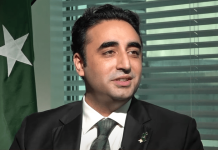ISLAMABAD: The Parliamentary Committee on the Appointment of Judges Friday approved the names of judges proposed by the Judicial Commission of Pakistan (JCP) for elevation to the Supreme Court.
The development came after a meeting of the parliamentary committee was held in Islamabad today to take a decision on the appointment of apex court judges.
The committee approved all the names proposed by the JCP which included Lahore High Court Chief Justice Malik Shahzad Ahmad Khan, Sindh High Court Chief Justice Aqeel Ahmad Abbasi and LHC’s Justice Shahid Bilal.
Last week, the JCP sent the names of three high court judges to be considered for elevation to the SC for final approval by the Parliamentary committee. The names, recommended for appointment to vacant SC seats, were proposed during a meeting of the Judicial Commission held under chairmanship of Chief Justice Qazi Faiz Isa, said the sources. CJP Isa had, last month, convened the JCP meeting for deliberations over the appointment of three judges in the SC. The JCP was constituted under the 18th Constitutional Amendment mandated to appoint judges in the superior judiciary.
It was tasked to consider names of nine judges, including LHC chief justice and SHC chief justice, for filling the three vacant posts in the apex court.
Chaired by the CJP, the meeting was to be attended JCP members —Justice Syed Mansoor Ali Shah, Justice Munib Akhtar, Justice Yahaya Afridi, Justice Amin-ud-Din Khan, Justice (retd) Manzoor Ahmed Malik, Federal Minister for Law Azam Nazir Tarar, Attorney General Mansoor Usman Awan and Pakistan Bar Council representative advocate Akhtar Hussain.
As per the Constitution, the actual strength of judges of the Supreme Court is 17 while at present the apex court only has 14 judges including the CJP.
The three posts are to be filled after the retirement of former chief justice Umar Ata Bandial and resignations of Justice Ijazul Ahsan and Justice Syed Mazahar Ali Akbar Naqvi.
Earlier, The Chief Justice of Lahore High Court (LHC), Justice Malik Shahzad Ahmed, stated that the establishment’s interference in the judiciary will soon come to an end.
Speaking at an event in Rawalpindi on Friday, the CJ highlighted his immediate actions upon assuming office. “I convened a full court meeting and decided that the culture of strikes would not be tolerated. On May 13, a circular was issued to the Punjab judiciary, stating that we would not acknowledge any calls for strikes. –Agencies






